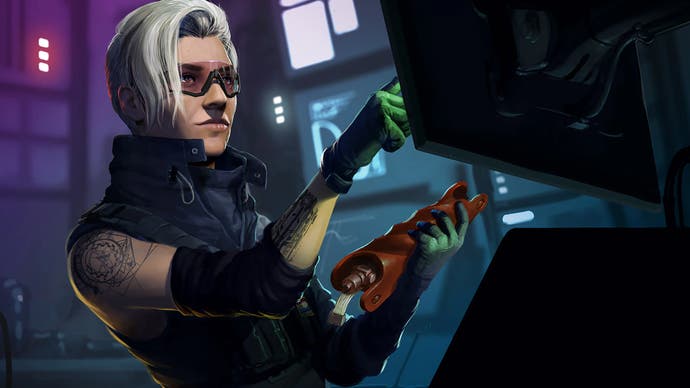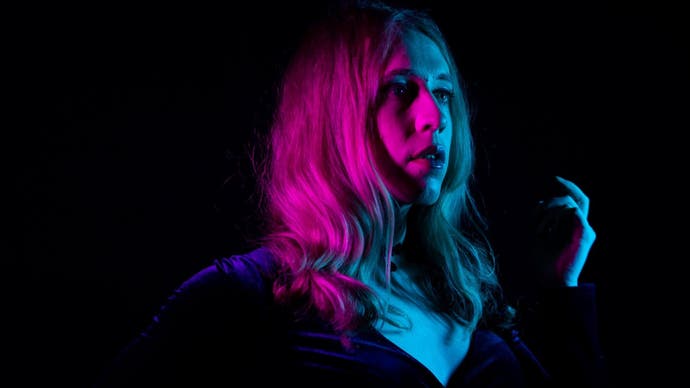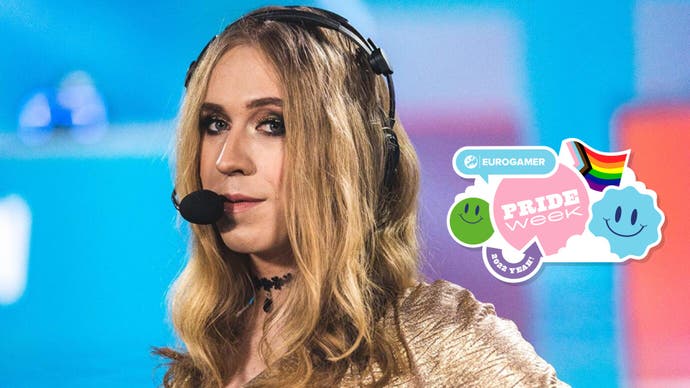Emi "Captain Fluke" on being the first openly trans esports caster
"It's definitely been an experience."
Hello! Once again, Eurogamer is marking Pride with a week of features celebrating the intersection of queer culture and gaming. Today, Ed Nightingale speaks to Emi "Captain Fluke" - esports' most prominent trans caster - about the past, present, and future of LGBTQ+ representation in the industry.
"If I can use the position that I'm in from the sort of privileges that I've been gifted here in esports world, then I need to make sure that I can leave it better than I came in, and then I can leave it happy with what I've done."
Emi "Captain Fluke" is an esports caster covering Rainbow Six: Siege and Valorant. In fact, she became the first openly trans caster of an esports major, a trailblazing position that's come with ups and downs.
She began by experimenting with games and content on YouTube. As she always enjoyed talking over games, she tested out some commentating with friends. Over time those streams got noticed and she was eventually offered paid work, leading her to become a full-time esports caster.
"You never stop coming out. There's never an end to it."
A lot of that passion was tied to Siege. "Siege was a game that I fell in love with," she says. "I think it scratched that itch in my brain where I love shooting games, but I love the chance of creative solutions. And that is the core of Siege for me."
Esports as an industry has a reputation for being toxic and unwelcoming for anyone who isn't a cis white straight male. But that's slowly changing, as more diverse players and casters are joining.
"It's definitely been an experience," says Emi. "[Abuse] happens on a sort of day to day basis. It's something where it's, as awkward as it is to say, I hope a lot of just 13/14 year olds that don't truly hold those views, but just hold the idea that they want to say things to hurt people. They want to be edgy, they want to be confrontational. They're teenagers, and they feel invincible.
"I also know that there is a big community that, although it might not be vocal every single day, they look towards me and they look towards the rest of the LGBTQ+ community, and they see someone to get behind.
"They're not out there giving it but every now and again you'll get a message of 'thank you for what you're doing'. And I think it's that weird dichotomy of people that want to hurt you are going to be the loudest, and the people that want somebody to look towards the most are going to be quiet because they need it the most."
Emi was certainly wary of coming out in the industry. She began transitioning before she became a professional esports caster, but as she notes: "You never stop coming out. There's never an end to it."
Eventually, as her work grew, she realised she needed to come out publicly. Yet online gaming is a very young and immature industry, while the advent of voice chat became "a big incubator for that problematic energy of teenagers who thought they had a room where they could say anything".
"It's created a very weird, toxic environment that's slowly being cleansed," she says. "But I think [coming out] had an element of 'I know this isn't gonna go down great'. Well, I kind of have to do it because...fuck it."
As her notoriety has grown, Emi has received plenty of positive support from her closest colleagues. "I haven't had a negative sort of interaction in terms of anyone I've directly worked with," she says.
And as her career has developed alongside a number of other now well established casters, her colleagues have supported her on her journey.
"They've had questions, I think it's always something that I'm never going to shy away from or shut down," she says. "I think it's obvious when someone is inquisitive, and someone who's malicious. I know it's often said that we shouldn't be the educators of people, they should be trying to educate themselves. But I am very much of the understanding that I'm the first in this industry to do this, at this level. I'm the first for a lot of these people to have an interaction with. I have to be receptive to the idea that people are going to have questions.
"And I have to be understanding that I'm going to have to answer these for as long as I'm in this role. I'm so excited for the future where more people are in this role and it becomes less of a thing that's put on me and I can disagree a little bit and pull back. But I know that my responsibility for now is to be able to answer at least some of these questions."

What also impacts the audience are the games themselves. Last year, Siege added its first trans character in Osa, as well as a character with a visible disability, a gay character, a Native American character, and most recently a non-binary character.
"I want to give a shout out here to the whole of the writing staff behind the game, and the creative staff, because they have been working on a fantastic push for diversity," says Emi.
And Ubisoft are facing an uphill battle. "Siege was originally built in that proto-military style. It appeals to a lot of younger cis white gamers, and male gamers especially," says Emi. "For [Ubisoft] to keep going 'fuck it, we're gonna keep pushing more and more openness and diversity', I think it's very good what they're doing. And I think it's the toughest audience to do."
Valorant, by contrast, has a more inclusive audience because Riot has built the game from the ground up to have a diverse roster of playable characters that appeal to a wider audience, and to focus on women in esports with The Game Changers programme.
"[Riot] has been very open and accepting towards that ideal," says Emi. "And it's reflected, I think, in the mentality of a lot of the players, in the mentality of the audience as well, which I think in terms of a gender divide of audience has one of the highest populations of people that aren't men. And that is rare in esports."
In short, when games themselves are more diverse and inclusive, it attracts a more diverse and inclusive audience. That's something Riot and Ubisoft are now acutely aware of, despite being criticised in the past for their less-than-progressive company cultures.
"You're drawn naturally to seeing things that you can relate to. And it brings you into the atmosphere, it brings you into the environment, you support the teams that you can see yourself in," says Emi. "And that is something that those games have built, and they've got an audience because of it."

Emi has seen great success in her role, in particular recently winning the Gayming Magazine award for Best LGBTQ Contribution to Esports. And while she does feel pressure being the first openly trans esports caster and a sense of responsibility as a role model, she also aims to stay grounded.
"I think that the pressure that I felt was that I had to be perfect, which no one is. You're tricked into thinking that by social media," she says. "So I think there's that pressure that I felt of 'I've always got to make sure I don't slip up'. But then the understanding and the realisation is that I haven't up to this point. And as long as I'm still making decisions that I think I can sleep with, and that I'm happy with, then that's it."
Earlier this year, the first Six Major Siege tournament of the year was hosted in Charlotte, North Carolina. And, post-pandemic, that allowed Emi to meet fans in person for the first time.
"Having so many people that are gender diverse or allies or they know somebody, coming up and talking and just being able to have conversations with those people, that was a moment where I feel like I'm doing a good thing," she says.
"And it's what allows you to keep going because otherwise people worry that they're not doing enough. But I think, to the people that it matters, you're always doing more than you'll ever know. And sometimes you need to remember that."
As a result of Emi's visibility - and other diverse casters - the face of esports is starting to shift and people in hiring positions are taking notice. The future is certainly more positive, compared to esports' toxic reputation.
"I see all the faces that are coming up, that are breaking the mould of what is understood," says Emi. "And the talent that they have is one that comes from a passion that I think has finally been unlocked by being able to see people like them represented up on the top level."

